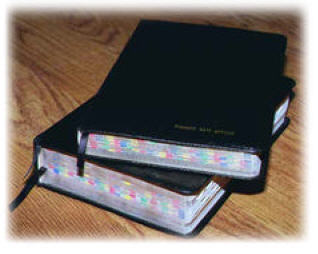By Mel Borup Chandler
Choosing Your Scriptures
 Latter-day Saints (“Mormons”) are members of The Church of Jesus Christ of Latter-day Saints. We call our scriptures (or set of canon) the standard works. These include an Authorized King James Version of the Holy Bible, Book of Mormon, Doctrine and Covenants, and the Pearl of Great Price. For non-English speakers, the Church has selected the version of the Bible in their language which most closely correlates with Mormon doctrine. The authorized KJV for The Church of Jesus Christ of Latter-day Saints contains a topical guide, a Bible dictionary, and cross references to other Latter-day Saint (“Mormon”) scripture.
Latter-day Saints (“Mormons”) are members of The Church of Jesus Christ of Latter-day Saints. We call our scriptures (or set of canon) the standard works. These include an Authorized King James Version of the Holy Bible, Book of Mormon, Doctrine and Covenants, and the Pearl of Great Price. For non-English speakers, the Church has selected the version of the Bible in their language which most closely correlates with Mormon doctrine. The authorized KJV for The Church of Jesus Christ of Latter-day Saints contains a topical guide, a Bible dictionary, and cross references to other Latter-day Saint (“Mormon”) scripture.
In the “Mormon Church” (as The Church of Jesus Christ of Latter-day Saints is often misnamed), people have different combinations of these books of scripture. Some prefer to have separate and individual books; some prefer to have what Mormons call a triple combination, which consists of the Book of Mormon, Doctrine and Covenants, and Pearl of Great Price in one; others prefer a quadruple combination, which contains all four books in the Latter-day Saint canon.
Storing Your Scriptures
Now that you have decided on a new set of scriptures, with either a triple combination and Bible or a quadruple combination, here are some practical pointers for taking care of them so that they will last for many years.
There are many different styles of scripture cases or bags that will work well with your scriptures. Leather is nice. Canvas is durable. Plastic is good to protect from water. Your books should be able to breathe. Leather or canvas probably make the best book bags. Additionally, some bags are quite decorative and fashionable and look more like a woman’s purse. Men usually prefer a solid color bag that looks masculine. This all depends on your personal taste.
What is important is that your scriptures be protected. One of the most common mistakes is to buy a bag that is too small. Your bag should probably be large enough to accommodate a lesson manual or study guide. Perhaps even a few marking pens or pencils as well.
When placing your scriptures in the bag, it is best to put them spine up or facing the ceiling. When the spine falls apart, the whole book will fall apart.
Also, when you put other things in your bag like class handouts or church programs, you can damage the pages of your scriptures when the spines are not facing upward. Although you may think a book is not fragile, when they are new or abused they can break apart.
Contrary to what most people think, the best way to store a book is laying it flat on its side. When a book is standing up on a bookshelf, it puts pressure on the spine and can cause problems in the future. The reason most people stand up books in a bookcase is for space and neatness, and so the titles can easily be read, but any true book lover will tell you a book lying on its side is best.
Moreover, a metal shelf is preferable over a wood shelf because wood emits an acidic gas that can damage the paper in a book. Notwithstanding, for most people, it is not a consideration unless you want to conserve the book for a lifetime or as an heirloom. Metal is also less vulnerable to wood and paper-eating pests. The term “book worm” is literally a description of a paper-eating pest. Most paper is made from trees or cloth. Some pest also likes to eat glue, and book bindings usually have plenty of glue holding them together.
Many people have limited knowledge about taking care of books. With new books, it is important to “break them in” as if they were a new pair of shoes. The back of the book where the pages attach to each other is called a spine. Book spines are made out of heavy-duty paper with flexible fibers or cloth and glue. Then the cover is glued or sewn onto the book.
Breaking in Your Scriptures
To break in your book, place the spine or binding of the book on a flat surface or table. Next, gently open the book and run your finger firmly along the part of the page where it attaches to the spine of the book. Gently do this in small sections or groups of pages of (about 20–50 pages at a time) until you get to the end of the book. You may hear a slight cracking sound, which is normal, but be careful and do this gingerly. As you do this, it will limber up the spine, and allow it to stretch, making it more pliable. This is necessary because new spines or bindings can be brittle if opened suddenly. This should be done with any book you hope to take good care of, not just scriptures.
Depending on the scriptures you have, you will probably notice that usually they are printed on high quality and very thin paper. This is done because the paper has an acid in it that degrades over time. If you have ever looked at a newspaper, after about a week, it looks old and yellow. That is because newspapers are printed on low quality paper, and the acid in the paper degrades them over time.
Scriptures are made to last many years, even a lifetime if they are taken good care of. Most scriptures are printed on acid free, archival paper. In some sets of scriptures, you will notice that there are gold-gilded pages. Some new volumes have gold gilding that can be sticky. The best solution is to carefully turn the pages one by one, and eventually they will loosen up.
If you have a leather cover, do not try to apply leather cleaning or dressing products or creams. These can damage the pages and stain them. You might also stain your clothing, besides ruining your book. Usually the oils from your fingers or hands are good for a leather book cover and are sufficient. Of course, when you handle your scriptures it is a good idea to wash your hands first, but it is not always practical.
Also, guard against allowing your scriptures to fall, and do not carelessly throw them on the floor, either at home or in church. Treat them with care and respect.
Marking Your Scriptures
You will also notice that many Christians like to mark certain meaningful scriptures. The best thing is to use a dull red pencil. A sharp pencil can tear or split the page and leaves grooves in the paper. Also, be aware that many marking or highlighting pens could bleed through the paper. If you want to use them, check them on a tiny portion just to be sure they will not bleed through the page. If they do, then don’t continue to use them.
The final word is that, if you treat your scriptures with the respect they deserve, they will probably last you a lifetime.
 Mel Borup Chandler writes about science and technology. He is a graduate of Weber State University. He is a former certified document examiner and handwriting analyst and is knowledgeable about archival, and preservation methods for old books and documents. He was once a regular contributor to Autograph Collectors Magazine. His Email address is mbccomentator @roadrunner.com.
Mel Borup Chandler writes about science and technology. He is a graduate of Weber State University. He is a former certified document examiner and handwriting analyst and is knowledgeable about archival, and preservation methods for old books and documents. He was once a regular contributor to Autograph Collectors Magazine. His Email address is mbccomentator @roadrunner.com.
Additional Resources:
